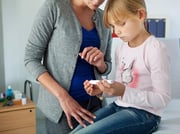Antiviral Meds Could Help Ease or Prevent Type 1 Diabetes in Kids, Study Finds
By Ernie Mundell HealthDay Reporter
WEDNESDAY, Oct. 4, 2023 (HealthDay News) -- Recent research has suggested that viruses could play a role in the loss of pancreatic beta cells, which triggers type 1 diabetes.
Now, a new trial finds antiviral medications, when given soon after a child is diagnosed with type 1 diabetes, might help preserve those vital beta cells.
Antiviral drugs could be “used alone, or as part of combination treatment regimens, to rescue insulin-producing beta cells at diagnosis of type 1 diabetes,” said a team that presented their findings Tuesday at the annual meeting of the European Association for the Study of Diabetes, in Hamburg, Germany. The research was published simultaneously in the journal Nature Medicine.
So-called beta cells in the pancreas produce insulin. But in some cases, a runaway autoimmune response causes the body to attack its own beta cells, ruining a child’s capacity to produce insulin and triggering type 1 diabetes.
People with type 1 diabetes (which comprises about 5% of all diabetes cases) rely on insulin injections to maintain healthy blood sugar levels the rest of their lives.
The researchers involved in the new study have been investigating the root causes of the autoimmune "cascade" behind beta cell destruction for years, and they discovered that low-grade infections with common germs known as enteroviruses often occur in the pancreatic cells of people newly diagnosed with type 1 diabetes.
What if these people were given antivirals — in this case, pleconaril and ribavirin — to rid the pancreas of these infections?
The new trial, led by Dr. Ida Maria Mynarek of Oslo University Hospital in Norway, sought to answer that question.
The team followed 96 children aged 6 to 15 who were all diagnosed with type 1 diabetes within three weeks prior to their enrollment in the study. The children were randomly selected to receive either the two antiviral medicines or a placebo for six months.
Mynarek’s group tracked blood levels of what are known as C-peptides in the blood. C-peptides “mirror the insulin production in the pancreas,” according to a meeting news release.
So, the higher a child's C-peptide levels on tests, the better their pancreas was producing insulin.
After one year of follow-up, the researchers found that C-peptide levels remained “significantly higher” in kids who’d gotten the antiviral treatment compared to those who hadn’t. That suggests the treatment helped shield the child's pancreatic beta cells from destruction.
While C-peptide levels dropped a full 24% in children who received the placebo, it fell by just 11% in those who got the antivirals, the investigators found.
On top of that, 86% of kids who’d gotten the antivirals still produced their own insulin at a level that makes treatment with supplementary insulin easier, the team said, and is also known to be linked to lowered risks for diabetes complications.
The treatment appeared to be safe, with no severe side effects noted.
According to Mynarek’s team, their research supports the notion “that a low-grade persistent virus infection is an underlying disease mechanism, and that type 1 diabetes may be prevented by development of new vaccines.”
The researchers concluded that "further studies should be done at an earlier stage in the disease process, to evaluate whether antiviral treatment could delay the progression of beta-cell damage leading to clinical type 1 diabetes.”
More information
HealthDay has more about type 1 diabetes.
SOURCE: European Association for the Study of Diabetes, news release, Oct. 3, 2023

The news stories provided in Health News and our Health-E News Newsletter are a service of the nationally syndicated HealthDay® news and information company. Stories refer to national trends and breaking health news, and are not necessarily indicative of or always supported by our facility and providers. This information is provided for informational and educational purposes only, and is not intended to be a substitute for medical advice, diagnosis, or treatment.

